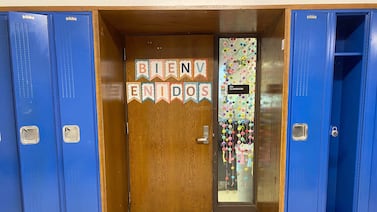Should Michigan school districts be required to publicly post curriculum, textbooks, literature, research projects, writing assignments, and field trips planned for the year by the first day of school?
Republican proponents of House Bill 5722 say yes, arguing that posting these items will lead to better transparency between schools and parents. Critics say the proposed bill would intimidate teachers and make it harder for them to be nimble with day-to-day lesson plans.
Rep. Gary Eisen, R-St. Clair Township, is lead sponsor of the bill and testified in front of the House Education Committee Tuesday. The measure is similar to “curriculum transparency bills” introduced across much of the country that take aim at what its conservative supporters say are “radical” classroom materials intended to indoctrinate students on race and other issues.
“This is a perfect opportunity for the schools and parents to work together instead of creating this perception of ‘what are you trying to hide?’” Eisen told committee members.
If Eisen’s bill were to become law, a district that failed to comply with the posting requirement would lose 5 percent of its state funding.
A larger, national conversation about classroom teachings and parental involvement in schools has intensified during the pandemic. Conservative legislators, governors, and right-wing groups in more than a dozen states are considering such bills. They are promoted by conservative think tanks in the wake of concern and confusion over teaching of Critical Race Theory and issues related to race, diversity, and social justice.
Across the country, school board meetings have become hostile as parents and activists criticize board members’ handling of COVID-19 safety measures and teaching related to race.
Critical race theory was not mentioned by lawmakers at Tuesday’s committee meeting. State Board of Education Vice President Pamela Pugh, a Democrat, told Bridge Michigan earlier this month she is concerned the GOP bill will lead to censorship of curricula, intimidation of teachers, and watering down of education.
At Tuesday’s hearing, Rep. Darrin Camilleri, D-Trenton, said that when he was a teacher, lesson plans would change depending on student needs, making it difficult for teachers to catalog all the material they will teach or distribute through the school year.
“You can plan out the best coursework that you think is going to happen in your year,” Camilleri said. “But the students that you have in your classroom are different than the ones that you planned for. They’ve got different learning abilities, they have different needs, they understand material differently.”
He said when he taught a course about Detroit history, students sometimes grasped the reading and lesson plan immediately. Other times, he said, learning took longer. For example, a current event would happen that would inform the discussion and his lesson plans would change. Instead of one week for a unit, it took four weeks.
“That’s a change from what I would have planned at the beginning of the year. So why would it be on me as a teacher to potentially put that 5 percent of school funding at risk? Because I had a change in my lesson plan? Because my students learned at a different level? Is that fair?”
Eisen said the goal of his legislation is not to require teachers to post “an hour-by-hour plan” for the school year, but provide an “overall, general curriculum that we’re going to try to follow. (It) just gives the parents a little heads up on what’s going on.”
If the bill were to become law, it’s unclear what the reporting process would be for someone who believes their district is not complying. The bill also does not address what would happen if parents object to subject matter described in the posted material.
Eisen, who owns a welding business and teaches martial arts, said he is an “educator, too,” and is used to providing course details to parents and adjusting “curriculum” depending on the needs of his athletes.
“Of course I have to modify it for certain kids, OK?” he said. “I mean, I don’t get the cream of the crop for the most athletic kids, OK. But I teach them.
“And I know what it’s like to be an educator, (it) may be (a) different situation, alright. But it’s the same thing. Something comes along, a tournament pops up, and we want to go to it, I got to let … my parents know, we make the adjustment.”
The nonpartisan House Fiscal Agency’s bill analysis said the legislation, if passed, would create as-yet-unspecified costs to the state, districts, and charter schools.
“A district or (charter school) would incur an indeterminate, but potentially significant, cost to make public the information required under the bill,” the agency’s fiscal analysis said. “The cost to an individual district or (charter school) will vary depending on the extent to which this information is not currently made public.”
Eisen said the bill’s current language is a starting point and that he is open to changes.
At Tuesday’s hearing, Rep. John Damoose, R-Harbor Springs, pointed to COVID-19 mitigation policies that prohibit parents from being in their children’s classrooms, part of what he sees as a growing pattern by schools to distance parents from their children’s education.
“It seems like every passing year, parents are kept further and further from the kids,” he said.
A similar GOP chord is being struck In the state senate, where Sen. Lana Theis, R-Brighton, introduced a resolution calling on Gov. Gretchen Whitmer to join in affirming parents’ right to direct their children’s education, including having a “central role in what it is their children are learning.” The resolution contends that “radical politics have permeated public school curricula, resulting in education that amounts to political indoctrination.”
Camilleri, the Trenton Democrat, said he believes “teachers are continuously under attack” and that House Bill 5722 furthers that.
“You’re only making it more difficult for them to want to do their job by saying that they’re not doing it already,” he said, “and that you’re going to be putting them in situations where they can put our school funding at risk.”
Rep. Lori Stone, D-Warren, noted Tuesday that schools already typically host back-to-school curriculum nights where parents can ask questions of their children’s teachers. She said that, as a teacher herself, she regularly attended professional development courses through the school year, then would apply what she had learned to her students.
She said it wasn’t uncommon for her to buy a new book during the year to read to her students.
But committee Chair Pamela Hornberger, R-Chesterfield Township, a bill sponsor and former art teacher, said there is a difference between general curriculum and what “teachers are doing in their classroom.”
She gave the example of a fourth-grade social studies curriculum: It would be approved for use across the entire school district but every teacher or every building of teachers would likely teach the subject matter somewhat differently.
She said if lawmakers focus on ensuring districts list their curriculum, then teachers can focus on letting parents know what they are doing through parent newsletters and parents can ask questions.
Hornberger said she thinks it would be “impossible” if every teacher had to post something at the beginning of the year.
Aside from general hesitation from Democratic lawmakers, Eisen also received feedback from some Republican colleagues.
Rep. Bryan Posthumus, R-Cannon Township, said he is concerned about the requirement for the district to post field trips. He said it’s important to balance transparency to parents with protecting the privacy of students.
“As we’re going through this process, let’s keep that in mind and make sure that we’re not publicizing for the world to see where all of our kids are going to be if they’re out and about on a field trip,” Posthumus said.
Eisen said he is open to changes and that including travel details and arrival times are not necessary. He also said he would be OK if a district were to list two field trips but then adjusts trips as needed.
The committee did not hold a vote on the bill Tuesday. The Michigan Department of Education did not immediately return a request for comment on the legislation.
Isabel Lohmann is an education reporter with Bridge Michigan.








